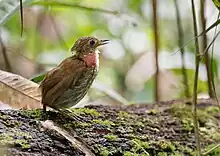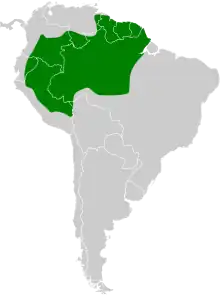Thrush-like antpitta
The thrush-like antpitta (Myrmothera campanisona) is a species of bird in the antpitta family Grallariidae. It is found in Amazonia.
| Thrush-like antpitta | |
|---|---|
 | |
| Scientific classification | |
| Domain: | Eukaryota |
| Kingdom: | Animalia |
| Phylum: | Chordata |
| Clade: | Dinosauria |
| Class: | Aves |
| Order: | Passeriformes |
| Family: | Grallariidae |
| Genus: | Myrmothera |
| Species: | M. campanisona |
| Binomial name | |
| Myrmothera campanisona (Hermann, 1783) | |
 | |
| Synonyms | |
|
Grallaria modesta | |
Taxonomy
The thrush-like antpitta was described in 1778 by the French polymath Comte de Buffon in his Histoire Naturelle des Oiseaux. Buffon used the French name "Le grand Béfroi". A hand-colour engraving was published separately to accompany Buffon's description.[2][3] Buffon did not introduce scientific names but 1783 the French naturalist Johann Hermann coined the binomial name Myrmornin campanisonam for Buffon's bird.[4] The specific epithet campanisona combines the Late Latin campana meaning "bell" with the Latin sonus meaning "sounding".[5] The thrush-like antpitta is now placed in the genus Myrmothera that was introduced in 1816 by Louis Vieillot.[6]
Distribution and habitat
It is found in Bolivia, Brazil, Colombia, Ecuador, French Guiana, Guyana, Peru, Suriname, and Venezuela. In 2018, the South American Classification Committee of the American Ornithological Society split one subspecies as Tapajos antpitta (Mymothera subcanescens).[7] Its natural habitat is subtropical or tropical moist lowland forest.
References
- BirdLife International (2018). "Myrmothera campanisona". IUCN Red List of Threatened Species. 2018: e.T22703355A130327580. doi:10.2305/IUCN.UK.2018-2.RLTS.T22703355A130327580.en. Retrieved 13 November 2021.
- Buffon, Georges-Louis Leclerc de (1778). "Le grand Béfroi". Histoire Naturelle des Oiseaux (in French). Vol. 4. Paris: De l'Imprimerie Royale. p. 470.
- Buffon, Georges-Louis Leclerc de; Martinet, François-Nicolas; Daubenton, Edme-Louis; Daubenton, Louis-Jean-Marie (1765–1783). "Le Beffoi, de Cayenne". Planches Enluminées D'Histoire Naturelle. Vol. 8. Paris: De L'Imprimerie Royale. Plate 706, Fig 1.
- Hermann, Johann (1783). Tabula affinitatum animalium olim academico specimine edita, nunc uberiore commentario illustrata cum annotationibus ad historiam naturalem animalium augendam facientibus (in Latin). Argentorati [Strasbourg]: Impensis Joh. Georgii Treuttel. p. 189.
- Jobling, James A. (2010). The Helm Dictionary of Scientific Bird Names. London: Christopher Helm. p. 87. ISBN 978-1-4081-2501-4.
- Gill, Frank; Donsker, David; Rasmussen, Pamela, eds. (July 2023). "Antthrushes, antpittas, gnateaters, tapaculos, crescentchests". IOC World Bird List Version 13.2. International Ornithologists' Union. Retrieved 6 August 2023.
- Remsen, J. V., Jr., J. I. Areta, C. D. Cadena, S. Claramunt, A. Jaramillo, J. F. Pacheco, J. Pérez-Emán, M. B. Robbins, F. G. Stiles, D. F. Stotz, and K. J. Zimmer. Version 21 June 2018. A classification of the bird species of South America. American Ornithologists' Union. http://www.museum.lsu.edu/~Remsen/SACCBaseline.htm retrieved 22 June 2018
